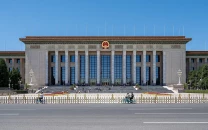OBL’s killing and the UN
Ban appears oblivious as to how the international legal system, which the UN oversees, applies to Osama's killing.

A ‘watershed moment’ in the global fight against terrorism, is how he described the raid on Osama bin Laden. But Ban appears oblivious as to how this applies more aptly to the international legal system, over which his world body presides.
Ten years ago, the United Nations revealed its impotence in keeping up with new and unprecedented threats to global peace and security. Thus, it stood on the sidelines as George W Bush condemned 9/11 as a declaration of war — not an act of international terrorism — on the US homeland. It allowed him to ignore distinctions between terrorist, and states harbouring them. On this basis, the UN supported the US retaliatory intervention in Afghanistan. Yet eight months later, the US itself admitted that no evidence existed that could prove the 9/11 plot had been hatched in Afghanistan or that the Taliban necessarily knew what its al Qaeda guests had been planning. Similarly, the UN was unable to prevent a so-called pre-emptive war in Iraq.
These should have prompted the world body to try and place the global war on terror, once and for all, firmly within the realms of the international legal system. It did not. Furthermore, under Ban’s watch, the UN raised no concerns when Barack Obama, as a US presidential candidate, said he would go into Pakistan to eliminate the al Qaeda chief, credible intelligence permitting. Obama never explained which international legal provision would allow such a unilateral strike and the UN never bothered to clarify that it should, presumably, be dependent on United Nation Security Council (UNSC) authorisation.
Under international law, without the consent of the second state, extra-territorial targeted killings constitute a sovereignty violation. Ditto if the second state is not in armed conflict with the targeting state, which Pakistan is not; or if it is not responsible for the armed conflict.
But this is where things begin to get murky. There are those who argue that by failing to flush out al Qaeda safe havens, including terrorist training camps, Pakistan is either facilitating al Qaeda’s ongoing war with the US or unable to stop armed attacks being launched from its soil. Thus, extra-territorial targeted killings could be justified under the self-defence premise outlined in Article 51 of the UN Charter. But, again, UNSC backing would be necessary.
Of course, Pakistan has, since 9/11, become known as the epicentre of the global jihad. Yet, the so-called global war on terror was launched exclusively in retaliation for 9/11 and not for any other international attacks such as the London bombings. And just as the former were not launched from Afghanistan, neither were they executed from Pakistan.
The UN needs to do more than produce academic papers exploring the issue of extra-territorial targeted killings. A resolution on their legality — either for or against — needs to be forthcoming. Ditto a resolution on the legality of assassination attempts on US nationals in second countries, such as the recent failed strike against al Qaeda kingpin, Anwar al-Awlaki, in Yemen.
The UN also needs to embark on a period of introspection over its future direction. Under Ban, it has become more ‘militarised’. The UNSC resolution on Libya was initially aimed at establishing a no-fly zone to protect the civilian population. That has now escalated to specific lethal force against Qaddafi. Similarly, the UNSC authorised UN peacekeepers in the Ivory Coast to use all necessary means to protect the population against the government, effectively charging those traditionally mandated to maintain peace to up arms and take sides in a civil war.
If the UN cannot even begin to respond to these concerns in concrete terms, it should admit its irrelevance and pack up shop. No resolution needed.
Published in The Express Tribune, May 20th, 2011.



















COMMENTS
Comments are moderated and generally will be posted if they are on-topic and not abusive.
For more information, please see our Comments FAQ